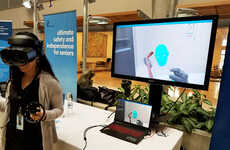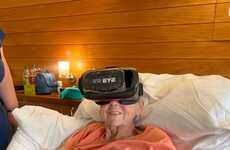
Mpathic VR Teaches Doctors to Deliver Bad News
Ellen Smith — May 15, 2017 — Social Good
References: medicalcyberworlds & mashable
A new virtual reality technology dubbed 'Mpathic VR' is helping future doctors practice delivering bad news to patients. Making the switch to empathetic conversations can be difficult for medical students and practicing doctors due to the fluctuating, high-stress, fast-paced environments they work in. Upset patients often storm out or refuse proper care due to doctor-patient miscommunication, which reportedly claim an estimated 210,000 to 440,000 lives annually.
MPathic VR aims to amend doctor's bedside manners through safe, virtually simulated conversations with a digital patient. The virtual patient has the ability to converse, emote and can even read body language. Doctors are able to practice various difficult scenarios through this technology, that allows them to make mistakes, grow and restart if things go south.
The MPathetic VR characters are designed to react as any real patient would, providing doctors with real-life confidence and skills they'll need to handle life-threatening situations.
MPathic VR aims to amend doctor's bedside manners through safe, virtually simulated conversations with a digital patient. The virtual patient has the ability to converse, emote and can even read body language. Doctors are able to practice various difficult scenarios through this technology, that allows them to make mistakes, grow and restart if things go south.
The MPathetic VR characters are designed to react as any real patient would, providing doctors with real-life confidence and skills they'll need to handle life-threatening situations.
Trend Themes
1. Virtual Reality Training - Using virtual reality technology to provide realistic training experiences for doctors.
2. Empathy in Healthcare - Focusing on developing empathy skills in medical professionals to improve doctor-patient communication.
3. Patient-centric Care - Shifting the focus of healthcare towards patient needs and preferences to enhance the quality of care.
Industry Implications
1. Healthcare - Utilizing virtual reality technology to train doctors and enhance patient care.
2. Education - Integrating virtual reality simulations into medical education to improve communication skills.
3. Technology - Developing innovative virtual reality solutions for healthcare training and patient engagement.
1.7
Score
Popularity
Activity
Freshness
















